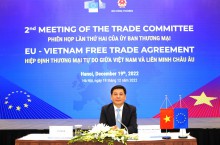The News
Portugal's non-tariff measures and other trade regulations
In addition to the EU's plans to implement mandatory and voluntary packaging and labelling issues, Portugal has its own plans. Packages and labels of goods consumed on the Portuguese market must be written in Portuguese.
In addition to the EU's plans to implement mandatory and voluntary packaging and labelling issues, Portugal has its own plans. Packages and labels of goods consumed on the Portuguese market must be written in Portuguese.
- Packaging and labeling requirements
In addition to the EU's plans to implement mandatory and voluntary packaging and labelling issues, Portugal has its own plans.
Packages and labels of goods consumed on the Portuguese market must be written in Portuguese. Exporters before exporting to this market should carefully consult the information from the importing partner in Portugal to see if there are any changes to labels and packaging, and there are specific regulations for some product groups such as pharmaceuticals, beverages, food and toxic products.
The outermost box should contain information about the weight, name and symbol of the consignee, port symbol, destination country and box number (the same as indicated on the packing slip) unless the content of the goods in the box has been clearly identified otherwise.
The symbols on the bags must match the symbols indicated on the bill of lading, commercial invoices and certificates of origin of goods.
The name of the country of origin must be shown in all shipments imported into Portugal.
Imported items such as gold, silver, platinum must be stamped with a guarantee or have a confirmation stamp.
Margarine, pharmaceuticals, threads, textiles, fertilizers, tobacco, wine, spirits and food are subject to special regulations and markings and labels.
Labels for pharmaceutical items must contain information about the ingredients contained in the product and the name of the representative and pharmacist concerned.

2. Regulations on phytosanitary
Most animal and plant goods imported into Portugal require a quarantine certificate.
3. Standard regulations
Portugal complies with the standards requirements in accordance with the general guidelines of the European Union. Although not mandatory, many Portuguese importers require their foreign counterparts to be ISO 9000 registered. The ISO registration process is not cheap and market demand for registration varies by product and service group.
When entering the Portuguese market, it is necessary to consider the mandatory standards that can be applied to each specific product and service. Importers are one of the useful sources of information to learn about these requirements, at least in the initial stages.
4. Import license
Portugal is a member state of the EU so the majority of goods are freely imported into the country. However, some items must have import permits such as agricultural goods and items used for military and civil purposes.
For items that are both used for military purposes and for civil purposes, a certificate of delivery is required. Some textiles and industrial goods from certain countries also require an import license into Portugal. The application for an import license needs to go to the General Directorate of External Commerce. Tobacco, alcoholic beverages and automobiles are subject to import controls through a number of bilateral trade agreements.
More information about import licenses is available at:
Ministry of Economy (ME)
Direccao-Geral das Relacoes Economicas e Internacionais
(General Directorate of Economic and International Relations)
Av. da Republica, 79-5 1050 Lisbon, Portugal
Tel: (351-1) 793 30 02
Fax: (351-1) 793 05 08
5. Import restrictions
The Department of Economic and International Relations (Direcca-Geral das Relacoes Economicas) of the Portuguese Ministry of Economy is responsible for import control. Imported goods that are not yet freely imported are only allowed to enter the Portuguese market by one of the following two conditions:
- Have an import license: applicable to products that are restricted from import under the quota regime according to EU regulations. The validity period of each type of license is different for different products.
- Have an import certificate: applicable to some industrial and agricultural products. The validity period of each type of certificate is different for different products.
Agricultural products are protected by quotas and managed by the licensing system. Portugal prohibits the import of some of the following specific products without a quota license:
- Cereal
- Rice
- Beef and veal
- Sugar and isoglucose
- Cooking oils and fats
- Seed
- Milk and dairy products
- Alcohol
- Processed vegetables
- Lamb
- Beef
- Goat meat.
Other information about import restrictions:
- Import licenses apply to certain items such as textiles, agricultural products and products used for both military and civilian purposes.
- Products imported under the liberalization program must be accompanied by an import declaration
- Import certificates are issued automatically.
- Import declarations are mainly used for statistical purposes.
- Items exempt from import duty include cultural, scientific and technical publications, newspapers and other items valued at no more than €700.
- The Bank of Portugal controls foreign exchange and delegates control to domestic commercial banks.



